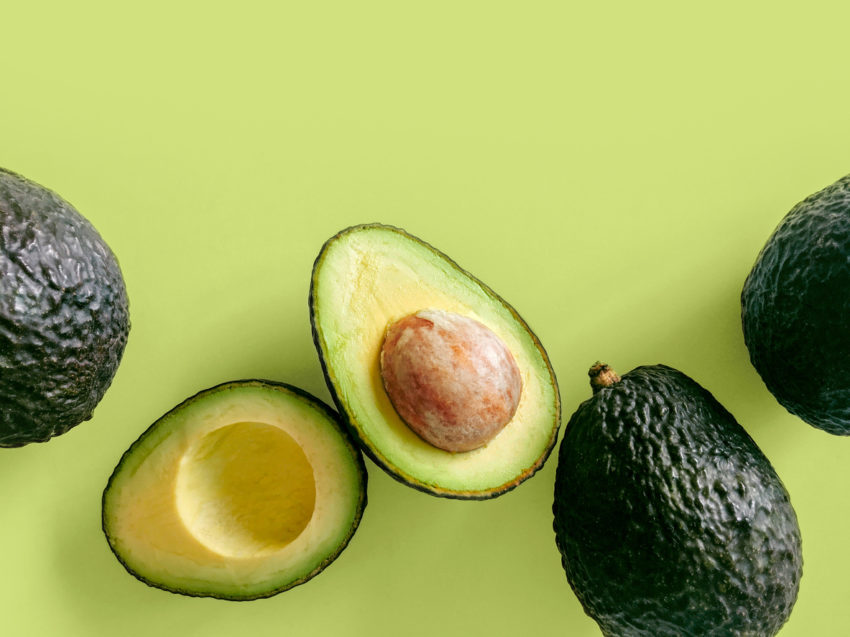
Share On Social!
Avocados are a key part of a nutritious diet for Latino families, according to new research from the University of California San Diego School of Medicine and the Herbert Wertheim School of Public Health and Human Longevity Science.
Researchers compared Latinos families who consumed a few avocados (three per week) and families who consumed a lot of avocados (14 per week) along with a standard nutrition intervention over six months.
Latino families who ate more avocados reported consuming fewer calories, saturated fats, and sodium, which are major contributors to obesity among Latinos.
They also had healthier hearts in terms of structure and function
“Recent trials have focused on individuals, primarily adults, and limited to changes in cardiometabolic disease blood markers. Our trial’s results provide evidence that a nutrition education and high avocado allotment reduces total caloric energy in Mexican heritage families,” lead study author Dr. Matthew Allison of UC San Diego told SciTechDaily.
Are Avocados Healthy?
Avocados are rich in vitamins C, E, K, and B6. They are also good sources of riboflavin, niacin, folate, pantothenic acid, magnesium, potassium, lutein, beta carotene, and omega-3 fatty acids.
 They are a heart-healthy fruit that provide naturally good fats and are cholesterol- and sodium-free.
They are a heart-healthy fruit that provide naturally good fats and are cholesterol- and sodium-free.
Replacing saturated fats with monounsaturated fats, like those found in avocados, may help reduce the risk of heart disease, according to the American Heart Association.
“Dietary fats are essential to heart health in that they give your body energy and help your body absorb key nutrients,“ said Chef Hamlet Garcia in videos featuring avocado recipes in English and Spanish. “Avocados, in moderation, are one of the best foods you can eat to maintain a healthy diet and help keep your risk for heart disease at bay.”
What Did the New Study Find about Avocados and Latino Family Health and Nutrition?
For the new study, researchers enrolled 72 Latino families (231 individuals). Each family had at least three members older than 5, resided in the same home, and were free of severe chronic disease and on no specific diets.
All families received 12 bi-weekly nutrition education sessions.
Half of the families got large allotments of avocados, the others low allotments for six months.
“At 6 months, the high avocado allotment group had a significant reduction in energy intake, carbohydrate, animal and vegetable protein, saturated and polyunsaturated fat, calcium, magnesium, sodium, potassium, iron, and vitamin D intakes (all p < 0.05),” according to the study. “A high allotment of avocados significantly reduced self-reported energy intake by 29% kcal/family/day, compared to a 3% kcal/family/day reduction in families who received a low allotment.”
These results show the benefits of avocados in public health efforts to reduce Latinos’ saturated fat and sodium intake.
“Culturally-appropriate plant-food interventions may alter the nutritional status of at-risk families,” according to the study.
The results also reinforced the nutritional profile of avocados.
“Based on their nutrient profile, avocados could be a favorable component of a plant-based eating pattern, with half of a medium-sized fruit providing up to 20% of the recommended daily fiber, 10% potassium, 5% magnesium, 15% folate, and 7.5 g of monounsaturated fatty acids,” study first author Dr. Lorena Pacheco of Harvard T.H. Chan School of Public Health and UC San Diego told SciTechDaily.
Why Do We Need to Address Latino Health and Nutrition?
Salud America! research shows that U.S. Latinos face health inequities in many areas—from poverty and social support to access to affordable housing and transit—that contribute to higher rates of obesity.
 Latino adults have higher obesity rates than their white peers (47% and 37.9%).
Latino adults have higher obesity rates than their white peers (47% and 37.9%).
Latino children do, too (20.7% and 11.7%).
This, in turn, leads to disparities in diabetes and risk for COVID-19, heart disease, certain cancers, and other health conditions. Addressing the root causes, such as improving access to healthy food, can help address obesity.
“The bottom line is: Childhood obesity rates are far too high,” said Dr. Amelie G. Ramirez, director of the Salud America! program at the Institute for Health Promotion Research at UT Health San Antonio. “Children of color, and those furthest from economic opportunity, are at greatest risk. The COVID-19 pandemic is probably making things worse.”
What You Can Do to Improve Latino Health and Nutrition?
As expansions to SNAP begin to impact Latinos and families, policy leaders have more work to do to ensure nutrition security.
The University of Connecticut’s Rudd Center for Food Policy & Obesity offers suggestions for actions that federal, state, and local governments can take, including creating nutrition standards for kids’ meals and eliminating unhealthy food and beverage marketing to children as a tax-deductible expense.
Recommendations also include how public health advocates and practitioners can push for changes to these marketing practices.
“Develop campaigns to increase public awareness of the vast amounts of primarily unhealthy fast-food advertising, especially advertising that disproportionately targets children, teens, and communities of color,” the Rudd Center report states. “Support youth-led counter marketing campaigns to expose marketing practices by the top fast-food advertisers.”
You can also make a difference in your community’s nutrition.
Download a Salud America! Health Equity Report Card!
The report card shows many local children live in food deserts, have low food access, and get SNAP food benefits. Then you can compare it to your state and to the country.
Email your Health Equity Report Card to community leaders and share it on social media. Then use it to make the case to address food insecurity and nutrition security where help is needed most!
Explore More:
Healthy FoodBy The Numbers
142
Percent
Expected rise in Latino cancer cases in coming years



